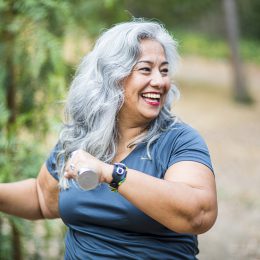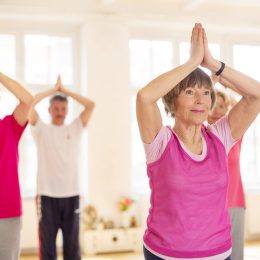How to Keep Your Brain Healthy: The SilverSneakers Guide
As you get older, your brain goes through some natural transitions. Try these science-backed strategies to keep it fully charged.

Our brains, like the rest of our bodies, naturally age. But maintaining brain health is possible, and it can even be social and fun. Even better? The strategies that boost your brain can benefit the rest of your wellness, too. Here’s a look at what’s going on up top.
What is brain health?
According to the National Institute of Aging, brain health refers to how well your brain functions in four major categories. All of these can be affected by age-related changes, in part because of structural shifts in the brain itself:
- Cognitive health: Learning, processing information, and remembering things
- Motor function: Controlling movement, including balance
- Emotional health: Interpreting and responding to emotions
- Tactile function: Noticing sensations of touch, including pain, pressure, and temperature
Regular exercise is a good way to help train your brain! With SilverSneakers, you can choose from dozens of different Community classes, visit a participating fitness location, or join one of 20+ SilverSneakers LIVE online classes. Check your eligibility here.
What brain changes are a natural part of getting older?
The brain goes through many changes as we age, both in structure and function. And it doesn’t start happening in the SilverSneakers years. According to experts at Columbia University, some of these shifts begin in our 30s and 40s. They may increase after age 60.
The changes to the physical structure of the brain due to aging can impact your memory and communication skills. You may find you have more challenges with recall, multitasking, learning new facts or skills, and attention. Here’s what’s going on:
Brain volume decreases. As you get older, your brain shrinks in size, especially in the frontal lobe and hippocampus. These areas are responsible for cognitive functioning, organizing tasks, and memory. How quickly brain mass decreases differs for everyone. It tends to be faster in men than in women, and it can be impacted by lifestyle habits.
Cortical density decreases. The outer surface of the brain thins as we age, and that affects the connections that send messages throughout the body. The result can be slower cognitive processing. For example, you might walk into a room and forget why you’re there, or it could take you an extra beat to answer a simple question.
Neurotransmitter production changes. Think of neurotransmitters as the chemical messages that are bounced around your body and brain. These can decline as we age, which can have a negative effect on cognitive function.
Amyloid beta production increases. This compound, which is typically associated with Alzheimer’s disease, increases as we age. But having it in your brain doesn’t mean you’ll develop Alzheimer’s. You need to have amyloid-beta plaques for that diagnosis.
What can affect brain health?
There are many other factors that affect how your brain works beyond normal structural changes. These include:
- Malnutrition and vitamin deficiencies
- Substance use, including alcohol and tobacco
- Mood disorders such as depression and anxiety
- Chronic disease, including heart disease, high blood pressure, high cholesterol, and diabetes
- Brain-specific conditions, such as dementia
- Accidents like falls that result in head injury
- Stress
- Sleep disruption
- Being sedentary
- Not doing activities that keep your mind active
- Social isolation, boredom, and loneliness
Experiencing one or more items on this list doesn’t necessarily mean your brain function will decline. But they can raise your risk of brain changes that may affect how you think, feel, and move.
Are there positive brain changes that come with aging?
There tends to be a drumbeat of downsides, but not all brain aging is bad news. Research has found that certain brain functions improve with time. Here are some of the upsides:
Sharper moral judgement. This involves decision making that is based on experience, compassion, and ethics. Because you have insight gained from a lifetime of experience, that comes into play when you evaluate situations and take action. Older adults are also better at reading social cues.
Better emotional regulation. Another positive aspect is an improved ability to navigate emotional ups and downs. Some studies find that people who are older tend to be happier than those who are middle-aged, and this may be one major reason why that happens.
Increased vocabulary and understanding. Even if you have moments where a word doesn’t come to mind, you likely have more options to draw from. The National Institute of Aging says that older adults have a more extensive vocabulary and greater knowledge of the depth of meaning of words than younger adults have.
Are there ways to improve brain function at any age?
Absolutely, yes. There are steps anyone can take to sharpen their cognitive skills. According to the U.S. Department of Health and Human Services, you should try these strategies to boost brain function and live a healthy lifestyle:
Control high blood pressure. High blood pressure, or hypertension, has harmful effects on the heart, blood vessels, and brain. It can increase your risk of stroke and vascular dementia. A normal blood pressure level is less than 120/80 mmHg.
Manage blood sugar. High blood sugar levels can lead to diabetes, which is linked to decreased cognitive function. It’s not only people with diabetes who may be impacted by blood sugar fluctuations. There are some foods that might raise your blood sugar temporarily, like coffee, bananas, and rice.
Keep your mind engaged. Like building muscles with strength training, the more you use your brain, the stronger your mind can become. Read a book, play board games, start a new hobby, volunteer, and have in-depth discussions. Your brain will thank you.
Stay connected with family and friends. Isolation and loneliness can profoundly affect brain health. Make time for regular social activities. Bonus points for combining these get-togethers with things like exercise or playing games.
Stay on top of checkups. Because health issues like cardiovascular disease and diabetes can affect your brain health, schedule regular health screenings. Have your hearing checked too. Hearing loss may affect cognition and make it more difficult to interact with others.
Get quality sleep. Aim for seven to eight hours of sleep every night and develop a bedtime routine that helps you fall asleep faster, like reading in a comfy chair or having a mug of herbal tea.
Does diet play a role in keeping your brain healthy?
The answer is a big yes. What you eat nourishes your brain as well as your body. Experts say eating certain foods and avoiding others can slow brain aging by more than seven years and may also reduce the risk of developing dementia.
To create an optimal brain diet, the Mayo Clinic combined the best of two of the healthiest diets. One is the Mediterranean diet, which focuses on fruits and vegetables, whole grains, and lean protein. The other is the DASH diet, which was developed for heart health.
Here are the major components:
- Dark leafy greens
- A variety of vegetables
- Berries
- Nuts
- Olive oil
- Fish, especially fatty fish like salmon
- Beans
- Whole grains
- Chicken and turkey
While too much alcohol can be harmful to the brain, the MIND diet allows for up to one glass of red wine a day. Some research suggests it can help fight inflammation and improve blood flow, including in the brain. Talk with your doctor to make sure that a few glasses of wine a week won’t interfere with any medications you’re taking.
Can exercise boost brain health?
There’s no question that movement is good for your head. Exercise is a major booster for brain health, and it can improve it in many ways, according to the Cleveland Clinic.
Subscribe to our newsletter
It's quick and easy. You could be one of the 13 million people who are eligible.
Already a member? Click to discover our 15,000+ participating locations.
Follow Us
That includes:
- Better cardiovascular health
- Improved blood flow to the brain
- Lower stress hormone levels
- Stronger nerve fibers in the brain
- Increased ability to form new neural connections
In one study, 454 older adults underwent yearly physical exams and cognitive tests for 20 years. Those who moved more scored better on memory and thinking tests and had a 31 percent lower risk of developing dementia than those who were more sedentary.
Even if you don’t meet the physical activity guidelines of getting 150 minutes of moderate-intensity activity weekly, you can still improve brain function by simply moving more often, according to the Cleveland Clinic.
If you need a starting point, press play to try two quick drills that can help improve cognition:
SilverSneakers fitness instructors often work brain-training exercises into their class choreography. For example, they might introduce tempo changes, or combine a steady march-in-place with different upper-body moves. They may even toss out some brain teasers while you’re doing a squat series.
You can find SilverSneakers classes at participating fitness locations or online through SilverSneakers LIVE. Check your eligibility here.
Recommended reading:
Make Every Workout Better — With Your Mind
4 Exercises That Buff Up Your Brain
We’re not saying you’ll never have another senior moment. But there’s plenty of things you can do to stay sharp as you age.
See Our Sources:
What is brain health/what affects brain health: National Institute on Aging. (2020) Cognitive Health and Older Adults
Brain changes: Columbia University. (2021) Changes That Occur to the Aging Brain: What Happens When We Get Older
Positive changes: National Institute on Aging. (2020) How the Aging Brain Affects Thinking
Affect brain health/improvement tips: Centers for Disease Control. (2021) Healthy Body, Healthier Brain
Gut health: Johns Hopkins Medicine. (2021) The Brain-Gut Connection
MIND diet: Mayo Clinic. (2019) Improve brain health with the MIND diet
Role of exercise: Cleveland Clinic. (2019) Why Exercise Protects Your Brain’s Health (and What Kind Is Best)
Activity study: Neurology. (2019) Physical exercise and activity may be important in reducing dementia risk at any age
Take Your Favorite SilverSneakers Classes Online!
SilverSneakers members can access live fitness classes and wellness workshops through SilverSneakers LIVE. See the latest schedule and RSVP for classes here.
Not a member? If you have a Medicare Plan, it may include SilverSneakers—at no additional cost. Check your eligibility instantly here.
Not eligible for SilverSneakers? You can still get 200+ free SilverSneakers On-Demand videos and stay in touch with us by creating your online account.





